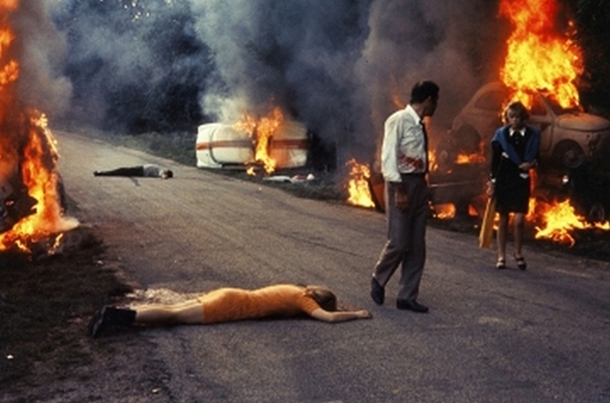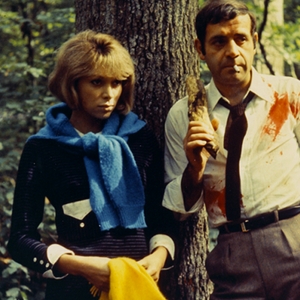
Cast: Mireille Darc, Jean Yanne, Jean-Pierre Kalfon
Directors: Jean-Luc Godard
Country: France | Italy
Genre: Drama | Comedy
Editor’s Notes: The following review is part of our coverage for TIFF’s Godard Forever: Part One which runs from January 23rd to Feburary 13th at TIFF Bell Lightbox. For more information on upcoming TIFF film series visit http://tiff.net and follow TIFF on Twitter at @TIFF_NET.
A self ascribed “film adrift in the cosmos”, Jean-Luc Godard’s Weekend begins with a scene of affluent domesticity, the camera moving through the expansive spaces of a wealthy couple’s home as blackness seeps in from their mutually destructive schemes and bored infidelities. The couple speaks of automobile accidents as though they were recreational activities, and violence begins to permeate the docile air as a systematic breakdown of social order seems to be perpetuating itself outside of their window. Someone has damaged a headlight and a scuffle ensues as the sacrosanct virginal nature of the automobile has been compromised and someone must pay. A synthetic score plays like background music to a television drama as two lovers speak of their sexual promiscuity, drowning out speech like in Godard’s 1966 film, Made in USA, but instead of servicing noir plot ambiguity he uses it as a tool to punctuate a typically Godardian bedroom exchange with uncharacteristically sinister undertones. A conservatively dressed young man smokes and listens to his lover’s tales of debauchery, attempting to analyze her predisposition to promiscuity while she mournfully relates passionate experiences as though she’s enacting a police confessional. Curtains behind them diffuse the sunlight and shrouds the couple in shadows as the woman describes these scenes in vivid detail, detached from the events as she sees herself as a bystander, a plaything to manifest another couple’s darkest sexual fantasies but unsure if she is relating a dream or actual events.
A self ascribed “film adrift in the cosmos”, Jean-Luc Godard’s Weekend begins with a scene of affluent domesticity, the camera moving through the expansive spaces of a wealthy couple’s home as blackness seeps in from their mutually destructive schemes and bored infidelities.
Violence continues to intensify as Roland and Corinne make their way outside to go on a weekend excursion to the country. Heightened tensions permeate the air with post-apocalyptic energies borne from diametrically opposed schools of thought as the couple encounters a traffic jam that has stopped all of civilization on a single road, complete with weekend activities, ballgames, and a complete circus. Horns bleat out in hopeless indignation at those that circumvent the “system” and drive in the other lane to get around the procession. Only a subversive would dare tread beyond the predetermined lines and attempt a path of lesser resistance! Children walk past dead bodies with casual indifference as the mechanisms that typically hide dead bodies from the eyes of civilization seem to have broken down and can no longer conceal the ubiquitous nature of mortality from innocent eyes with its usual haste.

The two manage to evade this breakdown of civilization to move onto a town where class warfare is being waged on the streets between a young intellectual and a farmer. The farmer sings of the unification of the human race, driving a tractor like someone displaced from 20s Soviet propaganda film. An accident between the tractor and a convertible occupied by two youths has taken place, but the two groups are no longer playing for the same leftist teams that once imposed fabricated solidarity between intellectuals and “peasant” classes. There is no heroic side in this futile warfare, so bystanders observe from the safe haven of colorful advertisements, staring on with blank indifferent stares. One yokel giggles at the scene as blood seems to be pouring from the automobile itself, the dead body inside secondary to the wounding of the young woman’s expensive Triumph.
Godard grants his film’s doomed participants the gift of cinematic awareness, but that only allows them to recognize the insanity without offering a means of escape from this cinematic wasteland.
The couple find wayward deities, figures seemingly plucked from literature, and an odd assortment of lunatics all caught up in the same leisurely trip through the apocalypse. They continue on their unrelenting road trip with manic indifference to the people surrounding them; pushing running bicyclists, pedestrians, and other motorists off the road, but human life has little meaning in a time when handbags are the biggest loss in a fiery accident. Godard grants his film’s doomed participants the gift of cinematic awareness, but that only allows them to recognize the insanity without offering a means of escape from this cinematic wasteland. As the couple encounters characters that are too cold and literary they cast them out of the film through immolation because this is no novel, this is film, a living, breathing artform that will not suffer philosophers and absurd Doolittlian nursery nonsense.
The group meets the end of their journey with a group of leftist revolutionaries hiding out in the woods. These revolutionaries are trained masters in the art of barbarism, the final evolution of civilization carried to fruition. Guerilla warfare is the last bastion of resistance against imperialist capitalism, offering the only viable option against a financially superior opposition and the only means for inferior forces to dictate the terms of their own existence. They speak in filmic terms, using film names as call signs as they raid picnics and prepare the bourgeoisie for a one course meat-meal. Weekend draws some bleak conclusions about the polemical disparity and fundamental disagreements between the “us” and “them”, but its satire finds Godard at the top of his game as he mixes the absurd with manic intellectualism to paint an apocalyptic nightmare of wrecked automobiles and cannibalistic revolutionaries.
[notification type="star"]99/100 ~ MASTERFUL. Weekend draws some bleak conclusions about the polemical disparity and fundamental disagreements between the “us” and “them”, but its satire finds Godard at the top of his game as he mixes the absurd with manic intellectualism to paint an apocalyptic nightmare of wrecked automobiles and cannibalistic revolutionaries.[/notification]



